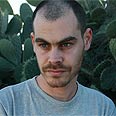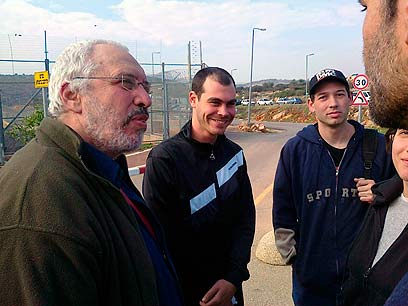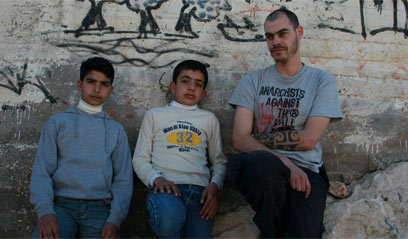
Anarachist Yonatan Pollack
צילום: שאול גולן
Back in action
Left-wing anarchist Yonatan Pollack emerged from prison itching to rejoin separation fence protests. He also expresses a certain yearning for Tahrir Square
Three days after leaving prison, Yonatan Pollack was already sitting in a house in the Palestinian town of Budrus as if he'd never left. The boy in the yard calls the 29-year old anarchist 'the man with the drawings on his arms', referring to his tattoos.
For two months he sat in the Hermon prison up north, cell number one, building 24, section four; just Pollack and his cellmate, Ali Tarar, who has been claiming that he is innocent of the murder of Danny Katz for over 26 years.
Pollack has been serving a sentence for a more minor transgression - participating in an illegal gathering. In 2008 he took part in a protest rally on bicycles in Tel Aviv where he was arrested by police detectives who recognized him. Judge Yitzhak Yitzhak sentenced him to a three month sentence due to an existing probationary sentence over his part in protests against the separation fence.
What did you do in prison?
"It was like living on a baby's schedule, eating and sleeping. At first I made up for lost sleep. I slept a lot. I was exhausted from all the protests, from the whole mess before coming to prison, the woman protesting in Bilin dying and the kick-up over the army's claims.
"For two weeks I slept well, and then the exhaustion passed. I read a lot, Jean Genet on the gentleness of prison violence. I packed plastic spoons, each time putting two separate groups of 50 spoons into a plastic bag. The Hermon prison is an open prison, there's a yard so you aren't in your cell for long stretches."

Pollack before his prison sentence (Photo: Hagai Aharon)
And the food?
"I'm vegan, so really just the regular food minus the meat and eggs. But I'm not spoiled. It didn't really bother me. This is the most comfortable prison in Israel. What I'll take with me from my prison experience is not the food or the facilities or the wakeup call it's the vast differences between us and the Palestinians. Everything I'm fighting for on the outside.
"For an offence like mine, for which I got a three month sentence, Abdallah Abu Rahmah received 18 months. In fact, the number of Jewish protestors who received prison sentences can be counted on one hand, the same as the number of Palestinians who didn't get prison sentences.
"My sentence term was shortened by a third; I had visitation rights and was written about in the newspapers. These are rights they don't have," he lamented.
On Thursday Yonatan Pollack was released, and his friends gave him a lift to his apartment in Jaffa. It is an apartment he rents together with his girlfriend and other friends. He's a man without property, and engages in bicycling, hitchhiking, and only recently has begun driving a small car.
On Friday he went to register as a released prisoner with the police and immediately headed out to the villages of Budrus, Bilin and Naalin. Wherever there are protestors, mostly Arabs and a few Israelis fighting against the separation fence, he can be found standing across from policemen and soldiers in an ongoing and permanent battle.
When did you come to the villages?
"I've been here since around 2002. That's when the protests against the fence started. These days I hardly take part in my anarchist friends' animal right protests. My friends in the city complain that I abandoned them in favor of the fence protests, that in my eyes, the fight for animal rights has become secondary to the villages' struggle."

'The more they take the more we sacrifice' (Photo: Shaul Golan)
So why are you here?
"Animal rights are very important to me, but being here and not there was a decision of the heart, not the head. The more emotionally involved you get, the higher the price and people get killed around you and you sink deeper into the struggle. It gets you and you can't go back.
"In June 2009 at the funeral of a friend who was killed by a sniper's bullet, I cried by his graveside and felt how deeply I was involved in this. A man next to me said: 'The more they take from us, the more we will be willing to give. To sacrifice.' Maybe that's what it's all about."
So, what else did he do in prison? What did he see? Everything that happened since the uprising in Tunisia. Tahrir Square, Mubarak, Gaddafi, he saw them all on the al-Arabiya channel which is transmitted in prison, not on the forbidden al-Jazeera.
How did you, as an anarchist, feel watching the revolution over there?
"Sadness, yearning, it's all so fascinating and exciting," he says with longing. "Do you know what it's like being an anarchist sitting in prison watching the anarchy and revolution happening somewhere else from a TV screen. I was sad that I wasn't there."
But today, after the revolution, things don't seem so great over there; Egypt is in the hands of the army officers and their likes?
"Even as an anarchist, a pseudo revolutionary, I know that the 'morning after' is appalling but to be present in a revolution is a once in a lifetime experience that I crave I get to experience. After all, the illusion that things will get better is always proven false and you always need to fight. Even those that seek a world without murder know that it will always exist. You need yearning and a struggle."
What did you find was hardest for you in prison?
"Feeling powerless. The illusion you have of power evaporates. But it was important for me to be in prison. After all, our activities are meant to undermine the existing boundaries, break through them and prison proves that even we, the Israeli-Jewish protestors, are no longer immune.
"We, who have always believed that everything is permitted and that there is no price to pay – are starting to pay the price. Which is why my prison term proves that our attempts to break through the borders are working, things are starting to stick to us as well."
- Follow Ynetnews on Facebook










